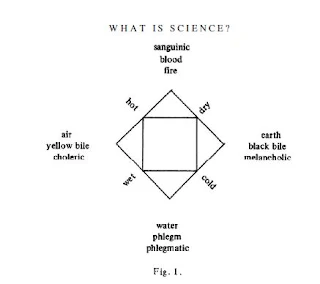interpretation of Hippocrates and other classics
 |
| interpretation of Hippocrates and other classics |
century. But a closer look at this science is most disappointing. The relation
between theory and practice widely differed in that medicine from what is
the case in ours. No doubt, from time immemorial there have been excellent
practitioners in medicine, men who made good for the lack of relevant theory
by keen observation and immense experience. But this impressive technique
was supplemented and supported by a science no more than in agriculture
and crafts, or rather – and this distinguishes medicine from agriculture and
crafts – a wide gulf yawned between so-called medical science and medical
technique, a gulf across which a bridge was under construction from the 16th
century to the 19th century by a true developing medical science. Up to
the end of the 18th century the collegium medicum consisted in a philological
interpretation of Hippocrates and other classics. This classroom
erudition and a few theses sufficed for a man to graduate as a doctor of
medicine who then learned the practice of his trade at home from his father
or uncle or from barbers and herb-women. The traces of his university study
were an academic title, a philosophy for Sundays, and a learned jargon. Why
do I tell this thus circumstantially? The reader knows academic professions
which are at present as far advanced as medicine was two centuries ago.
Greek medicine was a collection of empirical rules, bordered with a
background philosophy: according to the pattern of cosmic physics with
its four elements earth, water, air, and fire, the humours of the human body
were divided into black bile, phlegm (lymph), yellow bile, blood, and the
temperaments in melancholics, phlegmatics, cholerics, sanguinics, in order
to fit pathology and therapy in that physical cosmic frame. Even as late as
the beginning of the 16th century little was known about human anatomy,
not to mention physiology. A fundamental fact like the double circulation of
blood became known as late as the 17th century. Only after the invention of
the microscope could spermatozoids and ova be identified as components of
generation; the origin of infectious diseases has been known for no longer
than a century. We have come a long way.
How far have others of today’s techniques progressed from craftmanship
to scientific consolidation? There have been social techniques of government,
production and distribution as long as homo sapiens has lived in social
agglomerations. Of these techniques the best developed today is probably
so-called military science, that is the technology of warfare, which is based
upon numerous sciences and techniques – not only on those of nature. (I do
not discuss the question whether the more theoretically oriented political
military science and the so-called polemology is to be considered as a science
or rather a background philosophy.)
In the sequel when I discuss social techniques, I will disregard the techniques
of warfare, which is a quite special case. Social techniques are effective
on different size levels, which are today distinguished by the prefixes ‘micro’,
‘meso’, ‘macro’. In particular in the macro structure the social techniques are
characterised by a trend to regulate, transform, and control the social process.
Traffic regulations and time-tables are impressive examples of what in some
perspicuous sectors somehow succeeds, and what in less perspicuous ones as
national economy and social stratification is attempted. Nobody will regard
a traffic regulation or a time-table as a scientific product nor the designing of
it as a scientific achievement. They are, rather, quite characteristic instances of
techniques and engineering activities. The same certainly holds everywhere
where interventions into the social process are carried out or prepared.
Micro-economy, as an example, is a primeval technique, and traces of
macro-economy date back as far as the oldest kingdoms. Theoretical
attempts at economics in modern times show a full scientific character
according to each of our criteria, relevance, consistence, publicity. I think
the reason is that in economics all values can be measured with one measure,
money – or rather, this holds as far as economics is restricted to questions
where this is possible. Difficulties arise as soon as economical systems are
compared, which communicate so little with each other that their value
measures are incomparable. But another question is urgent: is economics
really a science, or rather a technique with a background philosophy, and
then not with one, but with several – decidely active – background philosophies,
depending upon the technical system they are expected to explain
and consolidate? In other words: Are not actions and intervention so much
in the foreground that knowledge, understanding, cognition do not get
decent opportunities to be exercised and aimed at?
The genesis and growth of sociology has little in common with that of
economics. In the beginning it was restricted to mere philosophy, then
numerous techniques were developed, genuine theories, too, which I have
the impression supplement rather than contradict each other, but these
theories serve the a posteriori exculpation of techniques rather than their
development.
If there is one discipline whose adepts are shocked if their field is called
a technology, it is law. I certainly know, and admit, that what is called
jurisprudence contains a full share of genuine science even if philosophy and
the history of law are disregarded, but I would look for this share where it
is not usually localised. The tradition that students of law are the right


عزيزي المشاهد لا تترك الموضوع بدون تعليق وتذكر ان تعليقك يدل عليك فلا تقل الا خيرا :: كلمات قليلة تساعدنا على الاستمرار في خدمتكم ادارة الموقع ... ( مَا يَلْفِظُ مِنْ قَوْلٍ إِلا لَدَيْهِ رَقِيبٌ عَتِيدٌ )